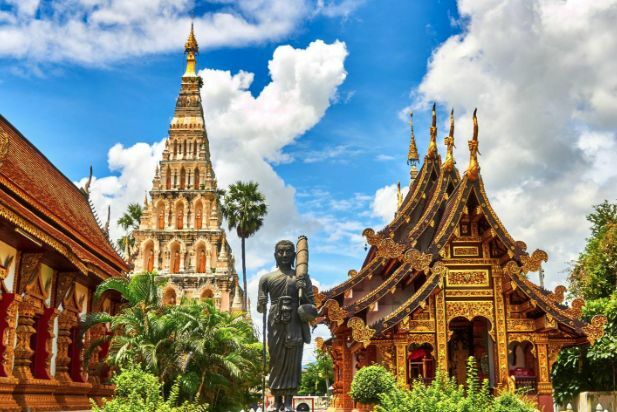Thailand’s film boom: Global collaboration opportunities
The Land of Smiles

Thailand is famous for its friendly people and welcoming culture. This beautiful country cherishes traditions yet is open to modern ideas and values. Buddhism and the monarchy have always been the anchors of the people and provide order, and stability and bring the Thai people together. Thailand also embraces progress which makes its capital city considered one of the best cosmopolitan cities in Asia blending culture and the latest trends.
What Thailand Can Offer

Thailand has numerous white sand beaches, lush countryside and landmarks, exquisite cuisine, and entertainment. The nightlife atmosphere in the country has always been vibrant and for this reason, many foreigners visit the country to enjoy the sun, sand, sea, and hospitality of the people. The same goes for Australia where people can enjoy the sun, sand and sea.
Filming in Thailand
The fantastic spots in Thailand are one of the huge reasons for moviemakers to choose the country for filming, like in the Australian movie “The Railway Man,” wherein a famous tourist destination in Thailand, the River Kwai, was filmed. The place offers beautiful locations, skilled and competent crew members and actors for the film, and affordable production expenses. The country is now becoming one of the most sought-after locations. However, know that this beautiful country has different restrictions than Australia. For example, the legal drinking age is 20 in Thailand, whereas in Australia it is 18, and gambling is strictly prohibited aside from horse racing and the lottery. That’s why you won’t find any casinos there, and if you see gambling scenes in Thai movies, they’re probably shot somewhere else or in a studio.
For those in Thailand with a desire to engage in real-money gaming, online options are available through the use of a VPN. Numerous online casinos cater to various currencies, providing a convenient alternative, such as the best-payout casinos in Australia. Embracing these online options ensures an enjoyable gaming experience while adhering to the local regulations in Thailand.
Thai Cinematic Overview
Thai cinema’s journey mirrors Thailand’s culture and the evolution of art and movies. The first motion picture, “Chok Sawng Chun (Double Luck) which was shown in movie theatres in 1927 was influenced by Western cinema. Later as the film industry in the country progressed, Thai films gradually made known their unique identity by blending traditional Thai storytelling with global cinematic techniques.
In the 1970’s more diverse genres were introduced such as horror, comedy, and action to meet the satisfaction of the moviegoers.
Classic Thai movies such as Sunset at Chaophraya in 1996 became popular making the film industry persist. Love amidst the war and star-crossed lover genre became a trend in that era in the country which was highly recognized internationally.
“Ong-Bak: Muay Thai Warrior” in 2005 witnessed international recognition at the turn of the century which earned awards at prestigious film festivals.
Current Film Industry in Thailand
Also referred to as the motion picture industry, it is one of the most successful industries worldwide. Its success is often derived from fresh and original stories that are presented on the screen to the viewers, the performance of the people behind the film, advanced technology, state-of-the-art studio, and marketing are some of the key factors of its success.
Thailand’s film industry is lively, and a significant participant in the Southeast Asia region. Their industry has produced various films from action-packed features, to horror, comedies, and drama/love story.
The year 2023 proved to be one of the breakthroughs in the Thai film industry. Around 20 films were streamlined through digital platforms and 60 films made their debut in cinemas.
Thai films usually make up about 30% of the revenue compared to Hollywood and Bollywood movies. However, two Thai films have exceeded the 100 million baht milestone in earnings this year.
Remarkably, “Tee Yod” and “Undertaker”, two Thai films stole the spotlight and proved to be huge hits. Their success is set to play a big role in the total earnings for Thai cinema this year, reigniting and instilling trust and confidence in Thai films. It is a surefire in bringing the audience back to the industry.
The Writers Guild of America and SAG-AFTRA, two influential industry groups were unhappy with how film studios shared revenue and their unauthorized use of the AI which resulted in Hollywood pausing production. The strike of these groups led to the postponement of several projects which resulted in a decrease in Thai competitors. This incident paved the way for the Thai industry to shine in the film industry and for the audience to discover their talent and what they can offer to the entertainment world.
“ThaiBan The Series” originally aimed at audiences in northeastern Thailand, starting with modest regional films. Over six years and multiple projects, the project honed their skills and gradually made their name.
The “Undertaker” on the other hand saw a surge in viewership in the second and third weeks and maintained their success defying the norm of other films. Most films typically reach their peak in the first week and then slowly decline – which is not the case with “Undertaker”. This proves that the project not only caught the interest of the audience but also made their interest to a high level.
Thai Cinematic Success
The success of Thai films emphasizes the impact of grassroots filmmaking. It shows that with dedication and skill development, even small-budget productions can captivate and retain the attention of audiences. Their unique blend of traditional values and contemporary storytelling defines their rich legacy and positions them as a dynamic force in global film.
Latest Thailand News
Follow The Thaiger on Google News:


























